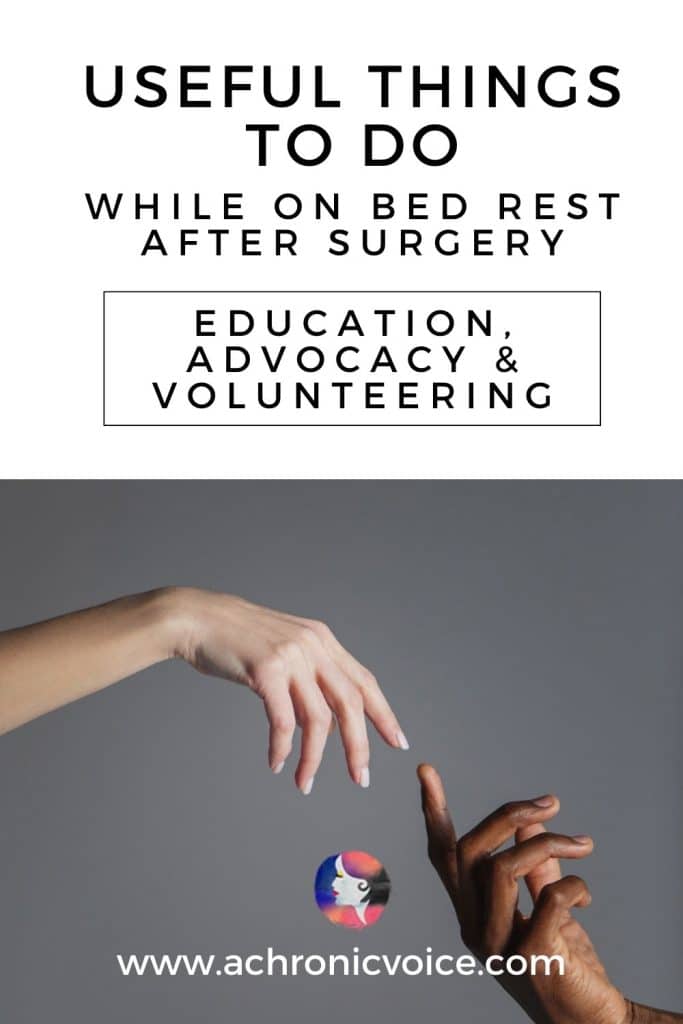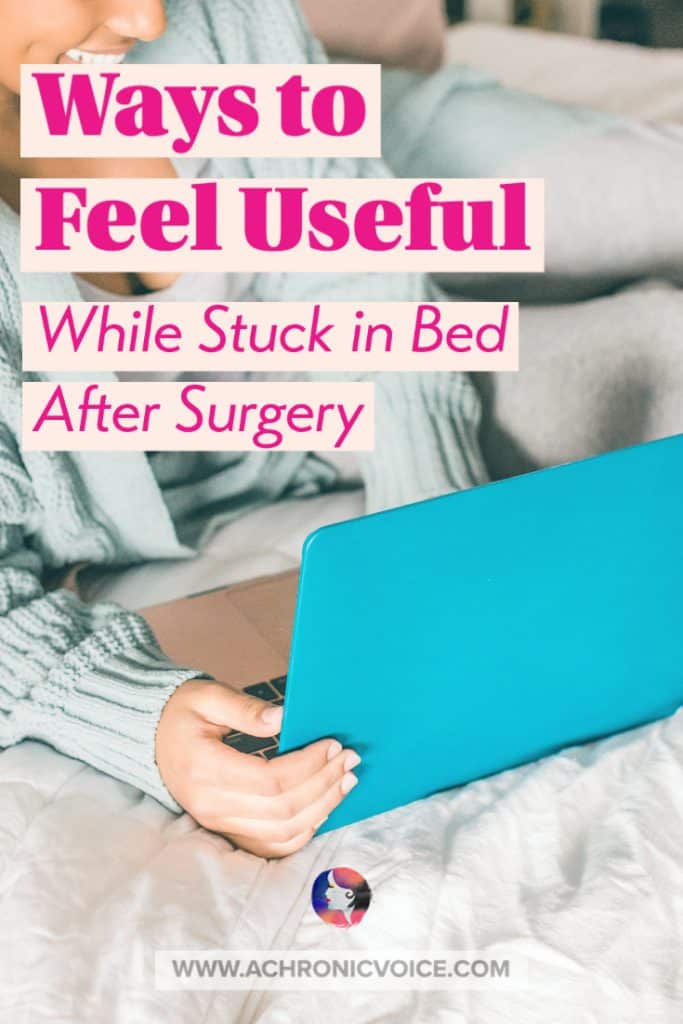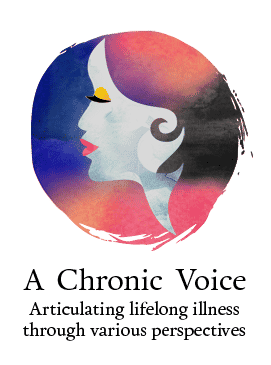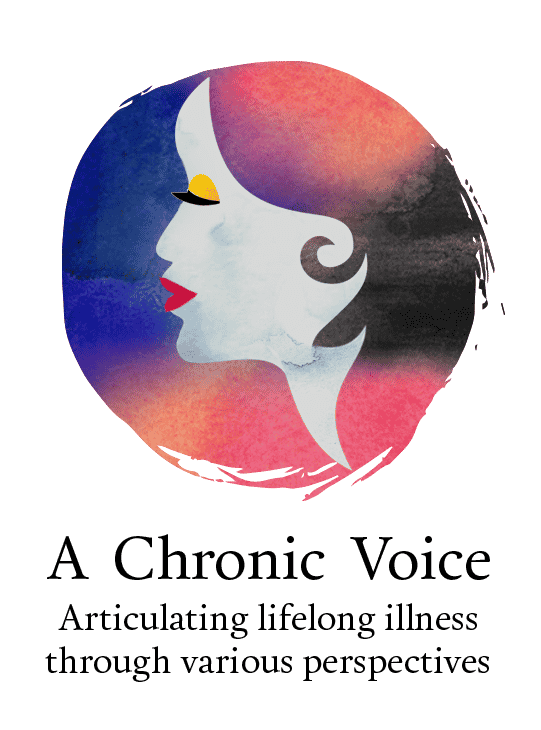This post is part of a series on my knee surgery and recovery journey, and how I coped with all that down time. I spent a good part of a year bed bound, in pain, and also bored. Afternoons were the toughest, as it felt like a state of limbo, where the world was speeding on by… without me. When I was in less pain, I wanted to channel some energy into being productive, apart from watching Netflix all day. (P.s. Nothing wrong if you want to Netflix all day either – healing takes top priority, after all!)
This entire series of posts covers different activities you can do, whilst stuck in bed or at home. This article in particular will focus on useful things to do while on bed rest after surgery. This includes self-education, advocacy work and volunteering – or how to be productive and feel a sense a purpose, even if you can’t leave your bed. (For more tips and ideas on things to do whilst bed bound, check out the links at the end of the post!)
Pin to Your Disability, Chronic Illness & Surgery Boards:
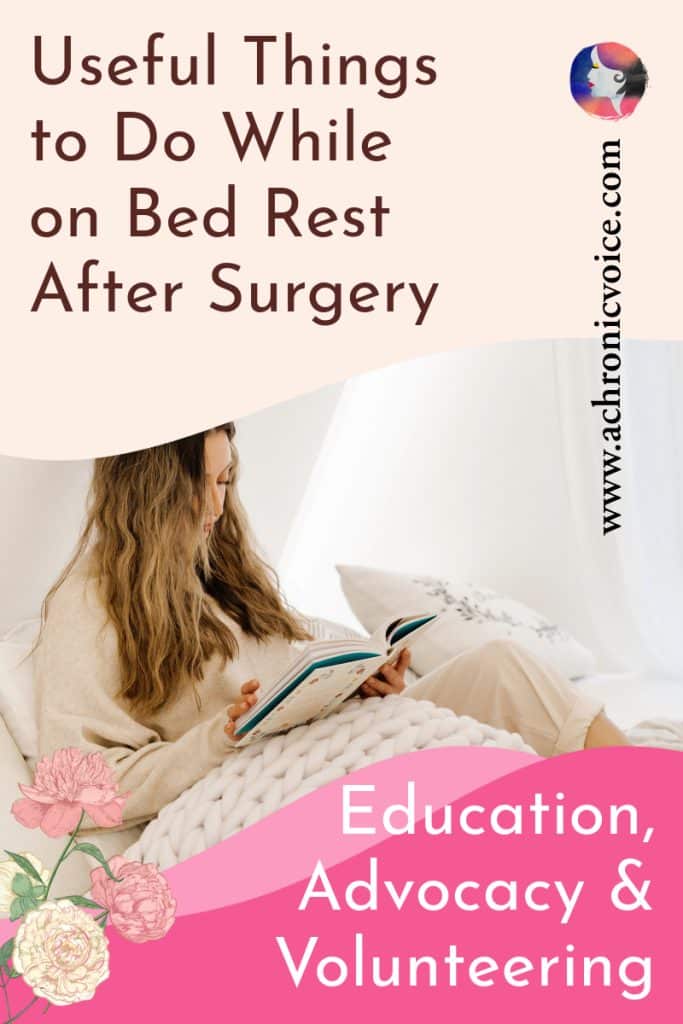
Disclaimer: Knee injuries and surgeries, or any surgery for that matter, varies widely from person to person. Your age, lifestyle, weight, circumstances, medications, comorbidities, allergies and other issues can impact your recovery timeline, as well as the tools and methods required. They should be adapted for YOU.
This article, and the resources or suggestions provided within, are based on MY own personal experiences with a spontaneous bilateral patellar tendon rupture, as a person with many chronic illnesses. They are meant for educational purposes and not to be substituted for medical advice. Please consult your own medical provider before trying anything out.
This post also contains affiliate links. It will cost you nothing to click on them. I will get a small referral fee from purchases you make, which helps with the maintenance of this blog (approx. $100/month). Thank you!
Items with a star ⭐ next to them are resources I’ve personally tried and would recommend!
Table of Contents
1. Education Isn’t Bound by Locations & Disabilities
If you’ve always wanted to get certified in a new skill set or upgrade an existing one, now is the perfect opportunity to do so. There are many online courses available these days, many of which are free as well.
Perhaps you’ve wondered about becoming a blogger, but don’t know where to start. Or perhaps you’ve always wanted to try your hand at photo editing or coding, but never found the time. Or maybe you always wanted to study literature or physics, but went down a more ‘practical’ career path instead. Well, now you have plenty of time to dive in.
Where to Find the Best Free Courses Online
If you do a search for ‘open courses’ online, you will find that many universities offer free education. This includes prestigious universities like Harvard and MIT. Open University has a full catalogue of useful courses, and Open Culture has a compiled list of “1,700 Free Online Courses from Top Universities” as well.
If you’re more interested in U.S.-related history and information, you can also check out “250+ Killer Digital Libraries and Archives” from the Open Education Database. They have free courses in business, data analysis, finance, healthcare, history, literature, mathematics, politics and law, programming, psychology….. and the list goes on!
LinkedIn now has their own learning platform as well. These courses are more focused on social media, time management, critical thinking, design, leadership, SEO, and other more tech or business-related topics. Very practical, and knowledge you can definitely use as we navigate a world that’s increasingly digital in nature.
Pin to Your Disability, Education & Self-Improvement Boards:
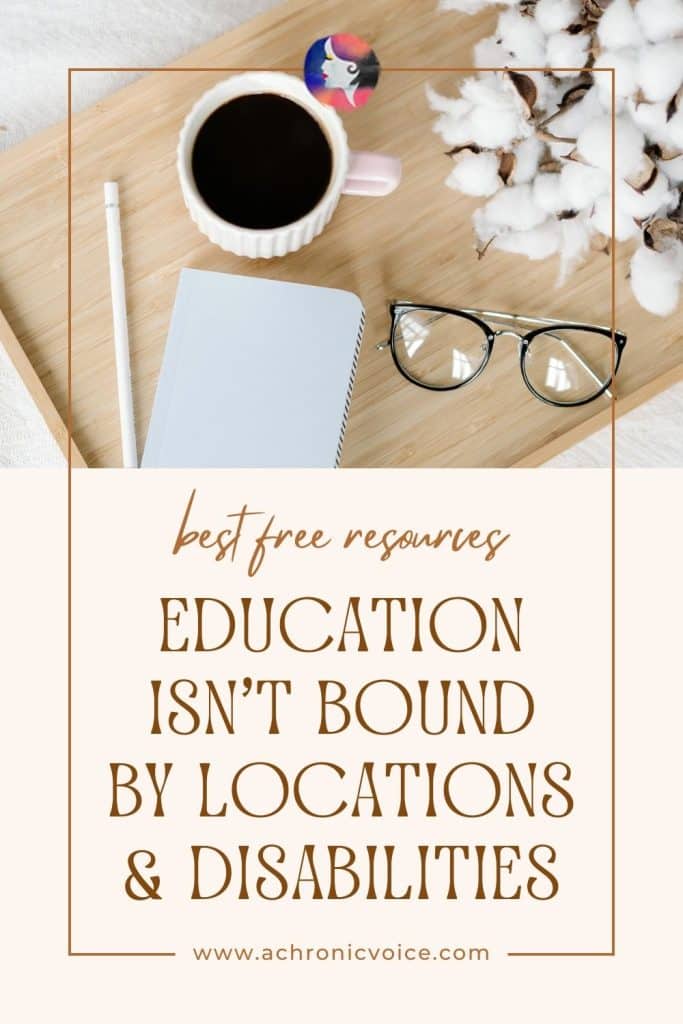
2. Read All the Books – For Knowledge, Inspiration & Fun
I’ve also been reading and buying more books, which honestly I don’t need because it ends up in the neverending yet-to-be-read pile. Sounds familiar?
Different genres can take your mind to different places. Fantasy and sci-fi can take you to new worlds. Novels, memoirs and fiction can generate empathy, hope, and bring perspective and meaning back to your life. Non-fiction books are great to learn new things from, and stimulate the brain. Maybe even help you to doze off – thinking is hard work, after all!
I’m sure you’re also wondering how best to recuperate from your knee surgery, and where to find resources beyond the 10 minute (or less) conversation you had with your surgeon. Now is the best time to learn how, through books written by qualified physiotherapists and doctors.
Book Resources I Found Useful While Recovering from Knee Surgery:
Magazines are Counted as Reading, Too!
Magazines are more visual, and there are many excellent ones on the market these days. From biking to hiking, gardening, arts and crafts, food, animals, poetry, architecture, lifestyle, animals, literature and so much more.
I like to read magazines on culture and travel in particular, as they show me things in a way that books can’t quite do. Magazines can make for a more relaxing read, as there is no real chronological order to follow. The visuals can be inspirational as well, especially when it comes to nature.
Some of my favourite magazine publications
- The Passenger: A cultural magazine that focuses on one country for each issue, and covers its politics, history, people, food, and other cultural facts and tidbits.
- Delayed Gratification: Which takes pride in its ‘slow journalism’ stance. They report on world events months later, which gives you the full scoop and broader picture of what’s truly going on. Their infographics are also impressive, and they have compiled a book full of them.
- Apartamento: It’s a nice blend of living spaces, architecture, art and culture. Less about houses as is, and more about the people who inhabit them, their lifestyle, and philosophies.
- Lucky Peach: Sadly, this magazine is no longer in publication. But you can check out the review I wrote for its final issue here, just to know what I mean by magazines being educational and beautiful, too!
⭐️ Recommended Magazines:
Reading widely is one of the most useful things to do while on bed rest after surgery. You won’t only be learning how to improve your quality of life physically, but all aspects of your well-being. So read, and read whatever you like. At the end of the day, it should be educational and/or enjoyable. Make it a routine, so it’s something you can look forward to at a specific time of day. Even a few times a day, if you like!
For audiobooks and reading on digital devices, check out part two of this series here.
3. Do Your Research on Knee Surgery Recovery Resources
Along your recovery journey, different accessibility and physiotherapy tools will be needed. You may not be able to use many of these resources yet, such as a wheelchair or walking frame. But when the time comes, you’ll know exactly what the differences are, and what you want for yourself. You’ll be surprised how intricate the little details can get.
Read up more about your medical condition and the research being done, or treatments available at present. You can discuss these options with your doctor, to see if they might be viable or suitable for your injury in particular.
Remember to use Google Scholar to verify and access credible information, and not random YouTube videos posted by fishy people looking to monetise off you. If you think that seeing someone’s face on social media means it’s legit, please know that deep fakes are getting popular and easier to create.
A Side Note on Physiotherapy, When You’re Able to Start
Out of all the things you can do while recovering from knee surgery, this is probably the most important. It is your key from disability back to ability. Sadly, fully ruptured knees will never be as good as the original. But the more you take your physiotherapy seriously, the better you’ll regain your functionality.
You will be given more physiotherapy exercises to do with each milestone you reach, and it’s important to stick to them. I know it’s difficult. It can feel like a chore, especially since it hurts, which your brain doesn’t like. Some weeks I’m just in too much pain from my ‘regular’ pain flares, so I can’t even do anything. If you live with chronic illness too, let’s face it – the recovery process will take more time, and might be more unpredictable. But that doesn’t matter.
What matters is that you do what you can, the best you can, when you can. Take it one day at a time, and in time you’ll get there.
“The #RecoveryProcess will take more time for those with #ChronicIllness..But what matters is that you do what you can, the best you can, when you can. Take it one day at a time & in time you’ll get there.” #ChronicPain #surgery #healing Click To Tweet4. Things to Do While on Bed Rest After Surgery – Plenty for the Bloggers!
⬇️ P.s. If you don’t blog, or don’t intend to start one, skip to the next section! ⬇️
Admittedly, I was in too much pain and too depressed to do anything for many weeks, much less keep up with my blog. And that’s okay. Take your time to grieve and let yourself feel what you need to feel while recovering from knee surgery. It is a life-changing event after all, and grieving is an important part of the healing process.
When I felt like I was in a better place mentally and emotionally, I started to blog again. My first post was more emotional, which was cathartic. Subsequently, I could write more about my knee injury experience, what I learned, and share resources to help others. These were all useful things to do while on bed rest after surgery, and gave me a slight bit of satisfaction at the end of the day, even if I was still upset about the whole situation.
If you’re a blogger, then you know that there is always 101 things to do next for your blog, be it planning, writing, creating graphics, or something else! I suppose that’s a good and bad thing. The bad part – learning when to stop. The good part – there’s always somewhere you can channel your energy and passion to. It can also be done even if you’re stuck in bed or at home.
“Take your time to grieve and let yourself feel what you need to feel while #recovering from #KneeSurgery. It is a life-changing event after all, and grieving is an important part of the #healing process.” #grief #disability Click To TweetOrganise Your Content Calendar & Plan New Blog Posts
For those who run into blogger’s block or don’t know what to write about next, a content planner can be helpful. Many bloggers would even say that their best blogging tip is to have a content calendar. A consistent posting schedule can help you to establish yourself, and connect with your readers. When they know what sort of content you post and when, they will start to keep an eye out for them.
This can be useful especially if you’re trying to target holiday seasons and Awareness Days. Here’s a list of Awareness Days for 2024 from Rutgers to have a think about if you need ideas.
I don’t really have a plan, but do jot down my ideas on TeuxDeux, and save post drafts in Google Docs. Other popular content planning tools you can use include: Trello, Evernote, and AirTable.
Now would be a great time to do a bit of research, content planning, and drafts. Come the time when life gets busier again, you’ll have content to keep your blog afloat!
Update Old Posts
If you’re in no mood to write a new post, you can always improve the quality of existing content, on-page SEO, and update the graphics. I still sift through my blog archives to update posts that I think have the potential to become more useful. This has helped them to appear in search engines as well, even if they were written years ago.
Give Your Website a Facelift
Maybe your blog has been around for 10 years, and it’s starting to look a little dated. Or perhaps you’ve always fancied a certain style, but had no time to revamp your site. OR maybe you’re using a free blogging platform, and want to move to self-hosted. Now is a great time to do all of the above. You’ll also have a powered-up, beautiful blog after to continue your advocacy work on after.
I guarantee that the hours will fly by – because that’s what happened to me as I finished up two websites – Sick Lessons and Blogging Bread. I also made a bio landing page using Carrd, since I already use it for my work site, Black & Web.
I love WordPress themes from Heartenmade, and can spend hours scrolling through Theme Forest. Elementor also has their own template library, and their drag-and-drop interface is extremely user-friendly.
If you’re looking for a hosting company, I’d recommend Cloudways for cloud hosting. I know many bloggers in the chronic illness community are on Lyrical Host (use code achronicvoice for 10% off!) for traditional DNS hosting, too.
As you can see, there are plenty of useful things to do while on bed rest after surgery, for the bloggers out there. Come join us in the chronic illness blogger community online, if it sounds interesting to you – I’d love to share your posts, too 🙂
Pin to Your Blogging & Chronic Illness Boards:
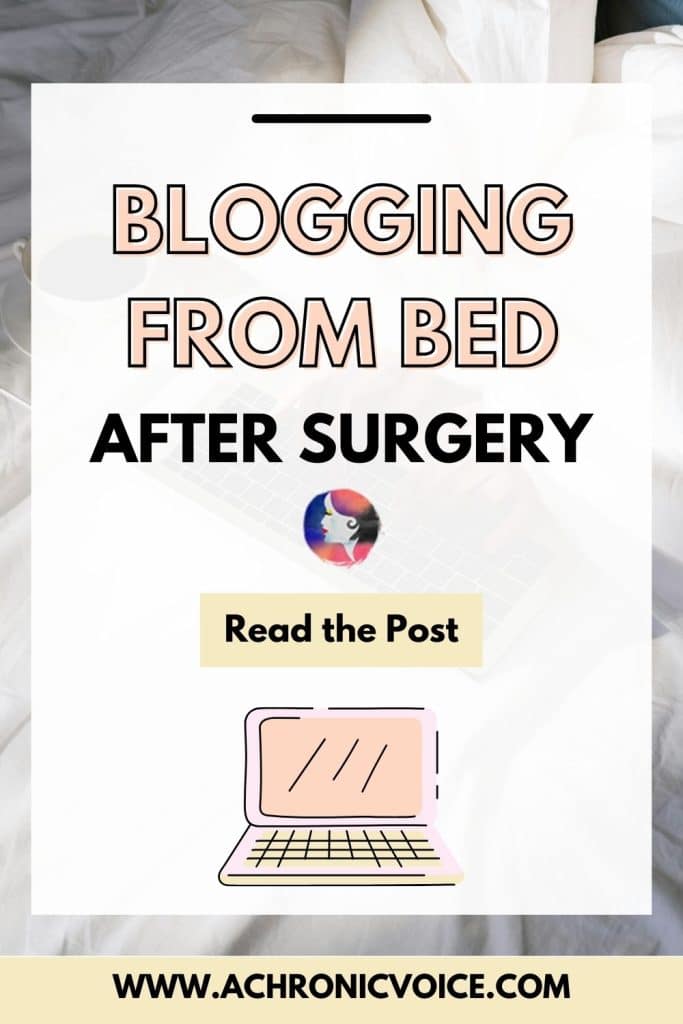
5. Continue or Start Advocacy Work
With the internet these days, advocacy opportunities are endless. If you are a chronic illness or disability blogger, continue to write and share about your experiences. You never know who your words and experiences may help, even if they don’t leave a comment on the post. I know that there are a number of ‘silent’ readers on my blog, which is fine by me.
If you don’t blog or do any advocacy work but would like to, why not come join the chronic illness and disability community? Lord knows we still need more advocates and awareness in society. There are so many rare diseases and mental illnesses that still hold a lot of stigma, with little to no research funding for them.
Read & Share Posts from Other Chronic Illness & Disabled Bloggers
Even if you aren’t a blogger, you can still make a difference. Reading and re-sharing blog posts from other chronic illness and disabled bloggers helps to raise awareness, too.
I highlight snippets I find useful via Instapaper, then schedule them on Buffer to Twitter and Facebook. If there are many snippets I find useful, I space them out in my Google Calendar for scheduling at a later date.
An unintended benefit was that I learned a lot about chronic illnesses other than my own. You will also make a blogger’s day, simply because you read, commented and/or shared a post they wrote!
Pin to Your Advocacy, Disability & Chronic Illness Boards:
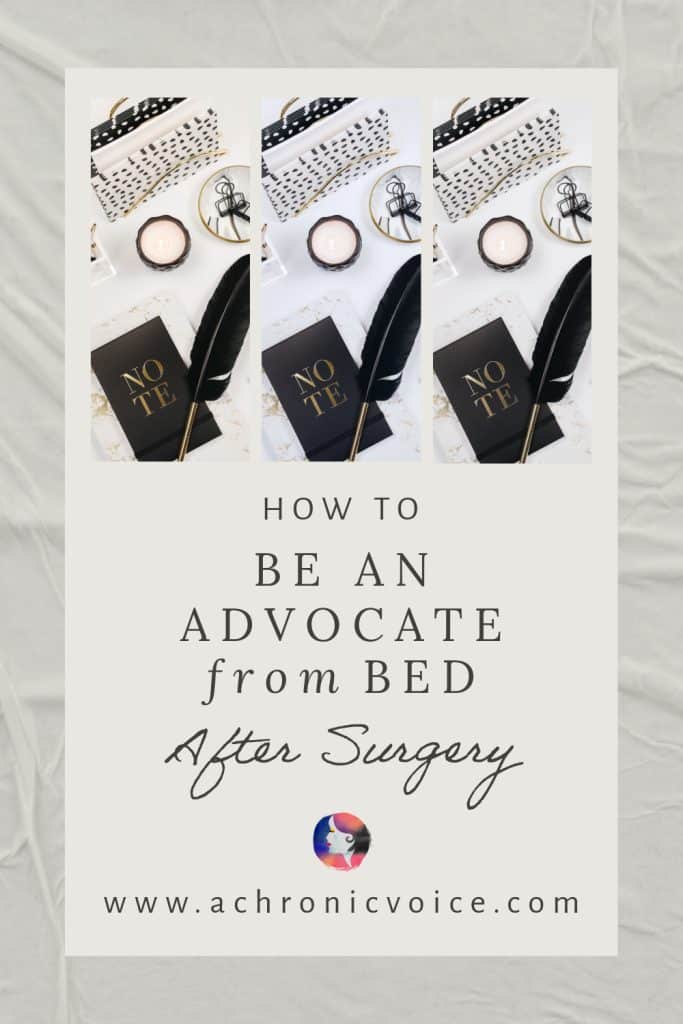
6. Volunteer Your Services for a Charity or Non-Profit Organisation
Starting a blog, YouTube or podcast channel are some ways to begin, but not the only ones. There are also existing non-profit, charity and healthcare organisations that are looking for volunteers. They may be looking for a social media manager, designer, content curator, or someone else. Whatever skills you do have – I’m sure they could benefit from it. If you’re looking to pick up a new skill, volunteering is a great hands-on way to do so as well.
If you’re sick of talking about illness all the time, you can volunteer for other meaningful causes as well. Such as a migrant crisis organisation, or your local animal shelter. There are so many causes around the world that need more hands to help out. My friend, Carrie, has a useful post on volunteering as a person with chronic illness or disability.
In Conclusion on Useful Things to Do While on Bed Rest After Surgery
It’s important to keep in mind that your value and worth as a human being are not defined by how much you do. You bring something into this world simply by being you, so strive to be the best version of yourself, in this present moment and situation. Wishing you fruitful learning experiences, and a speedy recovery. Take it step by step, day by day – you got this. Don’t forget to check out the full series below for more tips and ideas as well!
Pin to Your Surgery, Disability & Chronic Illness Boards:
